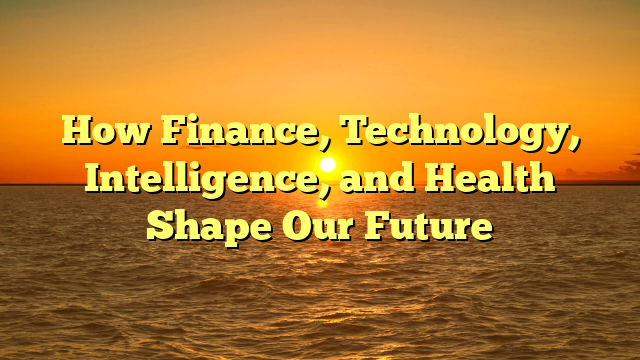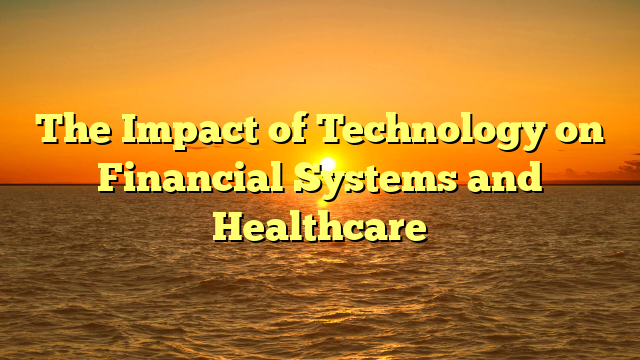The modern world is characterized by rapid changes in innovation, medicine, intelligence, and economic systems. These four domains are inextricably linked and often influence each other in ways that shape both individual and global outcomes. As we advance into the future, understanding the interaction between these fields becomes critical for policy-making, investing, and improving overall healthcare outcomes. In this article, we will explore how these sectors interact to create a more efficient and innovative society.
The Role of Finance in Modern Society
Finance is the backbone of economic growth, serving as the lifeblood for businesses, individuals, and governments. Over the past few decades, financial services has undergone significant transformations due to advancements in technology. Financial technology has become a prominent force in modernizing traditional financial services such as banking, insurance, and investment management. With Gerhanatoto of digital platforms and blockchain technology, financial transactions have become more secure and inclusive to a broader range of people across the globe.
For instance, cryptocurrencies, powered by blockchain, have gained popularity as alternative investments, and decentralized finance (DeFi) has revolutionized how individuals access loans, investments, and insurance. Smart contracts have further reduced the need for intermediaries, lowering transaction costs and enhancing transparency.
Furthermore, the integration of AI and machine learning into finance has enabled predictive analytics, improving investment strategies and risk management. AI-powered algorithms can process vast amounts of data in real time, identifying trends and providing real-time financial advice.
Technology: The Driver of Innovation
Technology plays a pivotal role in transforming the world of finance, healthcare, and intelligence. Innovations in technology have opened up new opportunities for startups, businesses, and even governments to solve complex problems in unique ways. The digital transformation is particularly evident in industries like finance, where mobile banking, blockchain, and machine learning have redefined traditional models of operation.
In healthcare, technological advancements such as remote care, wearable devices, and AI-driven diagnostic tools are revolutionizing patient care. Fitness trackers allow individuals to monitor their health in real time, providing data on blood pressure, caloric intake, and other health metrics. These insights empower individuals to take proactive measures to improve their health and well-being.
Artificial intelligence has also significantly impacted the healthcare industry by improving diagnostics. AI algorithms are now able to analyze medical images, predicting conditions such as cancer or heart disease with greater accuracy than human doctors in some cases. AI-driven drug discovery is also speeding up the process of developing new treatments for various diseases.
Intelligence: Artificial Intelligence and Its Role
Artificial intelligence (AI) has become a transformative force in numerous industries, from healthcare to finance, manufacturing, and beyond. In finance, AI is used to enhance decision-making processes, enabling real-time analysis of complex financial data to improve investment strategies and financial forecasting. In healthcare, AI assists in early disease detection, personalized treatment plans, and robotic surgery, making medical processes faster, safer, and more precise.
The ability of AI to process massive amounts of data has also improved intelligence gathering and decision-making in national security, business strategy, and scientific research. Machine learning models can detect patterns and anomalies in data sets, providing insights that humans might otherwise overlook. This capacity to analyze vast amounts of data enables organizations to make informed decisions with a higher degree of accuracy.
AI is not only transforming enterprise but also contributing to the enhancement of human intelligence. With the advent of neural networks and deep learning algorithms, AI can now simulate human cognitive abilities, such as problem-solving, language processing, and visual recognition. This innovation opens up new possibilities for creating more advanced machines that can assist in a variety of tasks.
Health: The Intersection of Wellness and Technology
Health and wellness are increasingly linked to both technology and financial systems. Advances in medical technology, such as AI-assisted diagnostics, robotic surgeries, and personalized medicine, are changing the way diseases are treated and prevented. At the same time, the financial industry has adapted to these innovations by developing new insurance models and payment systems that make healthcare more affordable and accessible.
For example, medical coverage companies are leveraging technology to offer personalized plans that align with an individual’s health profile. This approach, known as personalized health insurance, uses data from wearables, genetic testing, and lifestyle habits to predict future health needs and adjust premiums accordingly. Additionally, health-tech startups are offering new solutions to help individuals manage chronic conditions, monitor their fitness, and engage in preventative care.
Furthermore, advancements in digital health platforms are enabling people to manage their health remotely, receiving consultations from doctors via telemedicine or accessing medical advice through health apps. This is particularly beneficial for people living in remote areas or those who have difficulty accessing traditional healthcare services. By making healthcare more affordable, technology is playing a crucial role in improving public health outcomes.
The Future: How These Sectors Will Continue to Evolve
Looking to the future, the continued convergence of finance, technology, intelligence, and health promises to bring about even more significant changes. The rise of AI-powered financial tools, the integration of health data into financial planning, and the growth of personalized medicine are just the beginning of a broader trend. As these fields evolve, it is crucial to ensure that ethical standards and privacy concerns are addressed, particularly regarding the use of personal data.
In finance, blockchain and cryptocurrency will likely continue to reshape how we think about currency, investments, and financial transactions. AI and machine learning will also continue to drive more sophisticated and personalized investment strategies.
In healthcare, innovations such as gene therapy, nanotechnology, and further advancements in telemedicine will lead to more targeted and effective treatments. As technology continues to make healthcare more accessible, it will become increasingly important for individuals to take responsibility for their own health through lifestyle choices and preventive measures.
Conclusion: Embracing the Interconnected Future
The future of finance, technology, intelligence, and health is interdependent. These fields are evolving together to create a world that is more connected, efficient, and healthier for individuals and society as a whole. By continuing to leverage advancements in AI, blockchain, and digital tools, we can unlock new possibilities for improving financial stability and personal well-being. As we move forward, it is essential to balance the benefits of these technologies with the ethical considerations and privacy concerns that come with them.
Understanding and embracing the interconnectedness of these domains will be key to creating a sustainable and prosperous future for all.
How Finance, Technology, Intelligence, and Health Shape Our Future



